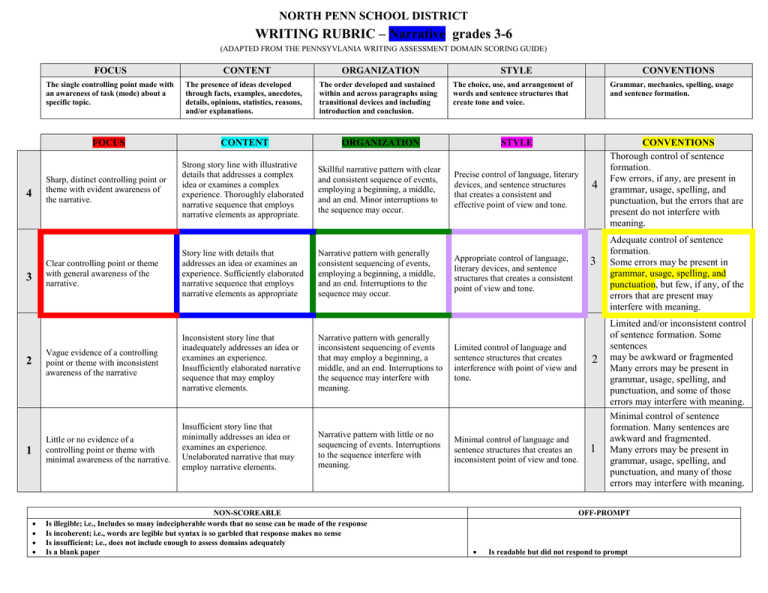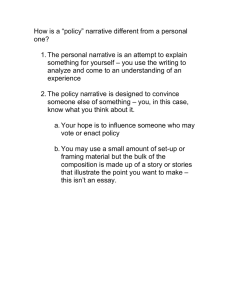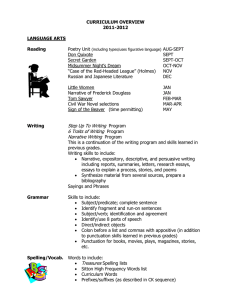WRITING RUBRIC – Narrative grades 3-6 NORTH PENN SCHOOL DISTRICT FOCUS CONTENT
advertisement

NORTH PENN SCHOOL DISTRICT WRITING RUBRIC – Narrative grades 3-6 (ADAPTED FROM THE PENNSYVLANIA WRITING ASSESSMENT DOMAIN SCORING GUIDE) FOCUS 3 2 1 ORGANIZATION The order developed and sustained within and across paragraphs using transitional devices and including introduction and conclusion. STYLE CONVENTIONS The single controlling point made with an awareness of task (mode) about a specific topic. The presence of ideas developed through facts, examples, anecdotes, details, opinions, statistics, reasons, and/or explanations. FOCUS CONTENT ORGANIZATION STYLE Strong story line with illustrative details that addresses a complex idea or examines a complex experience. Thoroughly elaborated narrative sequence that employs narrative elements as appropriate. Skillful narrative pattern with clear and consistent sequence of events, employing a beginning, a middle, and an end. Minor interruptions to the sequence may occur. Precise control of language, literary devices, and sentence structures that creates a consistent and effective point of view and tone. Sharp, distinct controlling point or theme with evident awareness of the narrative. 4 CONTENT Clear controlling point or theme with general awareness of the narrative. Story line with details that addresses an idea or examines an experience. Sufficiently elaborated narrative sequence that employs narrative elements as appropriate Narrative pattern with generally consistent sequencing of events, employing a beginning, a middle, and an end. Interruptions to the sequence may occur. Vague evidence of a controlling point or theme with inconsistent awareness of the narrative Inconsistent story line that inadequately addresses an idea or examines an experience. Insufficiently elaborated narrative sequence that may employ narrative elements. Narrative pattern with generally inconsistent sequencing of events that may employ a beginning, a middle, and an end. Interruptions to the sequence may interfere with meaning. Little or no evidence of a controlling point or theme with minimal awareness of the narrative. Insufficient story line that minimally addresses an idea or examines an experience. Unelaborated narrative that may employ narrative elements. Narrative pattern with little or no sequencing of events. Interruptions to the sequence interfere with meaning. NON-SCOREABLE Is illegible; i.e., Includes so many indecipherable words that no sense can be made of the response Is incoherent; i.e., words are legible but syntax is so garbled that response makes no sense Is insufficient; i.e., does not include enough to assess domains adequately Is a blank paper The choice, use, and arrangement of words and sentence structures that create tone and voice. Grammar, mechanics, spelling, usage and sentence formation. Appropriate control of language, literary devices, and sentence structures that creates a consistent point of view and tone. 4 3 Limited control of language and sentence structures that creates interference with point of view and tone. Minimal control of language and sentence structures that creates an inconsistent point of view and tone. CONVENTIONS Thorough control of sentence formation. Few errors, if any, are present in grammar, usage, spelling, and punctuation, but the errors that are present do not interfere with meaning. Adequate control of sentence formation. Some errors may be present in grammar, usage, spelling, and punctuation, but few, if any, of the errors that are present may interfere with meaning. 2 Limited and/or inconsistent control of sentence formation. Some sentences may be awkward or fragmented Many errors may be present in grammar, usage, spelling, and punctuation, and some of those errors may interfere with meaning. 1 Minimal control of sentence formation. Many sentences are awkward and fragmented. Many errors may be present in grammar, usage, spelling, and punctuation, and many of those errors may interfere with meaning. OFF-PROMPT Is readable but did not respond to prompt



